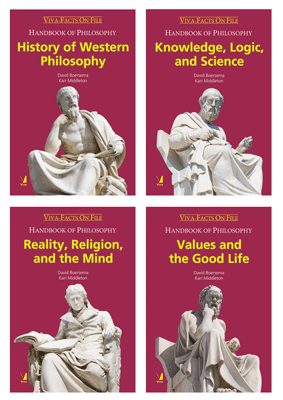
Handbook of Philosophy, 4 Vol Set
Handbook of Philosophy, 4 Vol Set
₹8,095.50 ₹8,995.00 Save: ₹899.50 (10%)
Go to cartISBN: 9788130924540
Bind: Hardbound
Year: 2014
Pages: 1372
Size: 153 x 229 mm
Publisher: Facts On File Inc.
Published in India by: Viva Books
Exclusive Distributors: Viva Books
Sales Territory: India, Nepal, Pakistan, Bangladesh, Sri Lanka
...a lucid, widely accessible overview...Recommended.
—Choice
We all face philosophical questions and concerns every day. Far from being abstract and subjective, philosophy is fundamental not only to what we do with our lives, but also to who we are and who we hope to be. The new, four-volume Viva-Facts On File Handbook of Philosophy set provides an accessible and engaging introduction to this important subject. Authors David Boersema and Kari Middleton are academic philosophers who specialize in teaching their subject to beginning philosophical students.
Ideal for students and scholars, this set provides a comprehensive survey of philosophy, and each book features an index, an appendix, a bibliography, and a glossary.
Volume 1: History of Western Philosophy
History of Western Philosophy outlines the history of Western philosophy from the beginnings to the present day. Philosophers usually speak of classical philosophy (600 BCE to 400 CE), medieval and renaissance philosophy (400 to 1600), modern philosophy (1600 to 1900), and contemporary philosophy (1900 to today). This brand-new volume discusses the major thinkers of each of these periods and their most influential ideas.
Contents:
Introduction • Part I: Western Philosophy, from the Greeks to the Renaissance • Introductory Discussion Questions • The Greek Miracle • Elements and the Nature of Change • Heraclitus and Change • Changelessness and Mathematics • Greek Atomism • Sophists and Socrates • Plato • Aristotle • Hellenistic Philosophy • Medieval and Renaissance Philosophy • Concluding Discussion Questions • Further Reading • Glossary • Key People • Part II: Modern Philosophy • Introductory Discussion Questions • An Overview of Modern Philosophy • Introduction to Empiricism and Rationalism • Ren?? Descartes • Thomas Hobbes • Baruch Spinoza • Gottfried Wilhelm Leibniz • John Locke • Jean-Jacques Rousseau • George Berkeley • David Hume • Immanuel Kant • Concluding Discussion Questions • Further Reading • Glossary • Key People • Part III: Continental Philosophy • Introductory Discussion Questions • Introduction to Continental Philosophy • Hegel and German Idealism • Karl Marx • S??ren Kierkegaard • Friedrich Nietzsche • Phenomenology • Edmund Husserl • Martin Heidegger • Existentialism • Jean-Paul Sartre • Simone de Beauvoir • Hermeneutics • Critical Theory • Structuralism • Post-structuralism, Deconstruction, and Postmodernism • Continental Philosophy Today • Concluding Discussion Questions • Further Reading • Glossary • Key People • Part IV: Analytic Philosophy • Introductory Discussion Questions • Analytic Philosophy • Gottlob Frege • G. E. Moore and Bertrand Russell • The Early Work of Ludwig Wittgenstein • Logical Positivism • Wittgenstein and the Philosophical Investigations • Ordinary Language Philosophy • Willard Van Orman Quine • New Developments • More Recent Developments???Saul Kripke • Pragmatist Responses to Analytic Philosophy • Concluding Discussion Questions • Further Reading • Glossary • Key People • Index
Volume 2: Reality, Religion, and the Mind
Reality, Religion, and the Mind examines metaphysics, the basic, broad study of reality. The field encompasses such fundamental questions as the following: Is there really a God? Is there life on other planets? Do other people feel the same sensations that I do? In addition, this volume explores philosophy of mind, a subfield within metaphysics, which asks such questions as whether the mind is the same thing as the brain. Coverage also includes philosophy of religion, another subfield within metaphysics. What, or who, is God? Are there souls? Can science and religion contradict each other? Is there a religious reality that is different from a scientific one? Reality, Religion, and the Mind outlines different ways philosophers have attempted to answer these questions and more.
Contents:
Introduction • Part I: Metaphysics • Introductory Discussion Questions • Introduction to Metaphysics • Categories of Reality • Universals and Particulars • Causality and Knowledge of the World • The Rejection of Metaphysics • Emergentism • Images of the World • Consciousness and Freedom • Modality and Possible Worlds • Concluding Discussion Questions • Further Reading • Glossary • Key People • Part II: Philosophy of Religion • Introductory Discussion Questions • What Is Philosophy of Religion? • Faith and Philosophy • Religious Epistemology and the Ontological Argument • The Cosmological Argument • Argument from Design • Natural versus Revealed Religion • The Nature of God's Perfection • Theodicy and the Problem of Evil • Modern Science and Ethics • Twentieth-Century Philosophy • Concluding Discussion Questions • Further Reading • Glossary • Key People • Part III: Philosophy of Mind • Introductory Discussion Questions • What Is Philosophy of Mind? • The Mind/Body Problem, Dualism, and Monism • Solipsism and the Problem of Other Minds • Mental Causation and Parallelism • Epiphenomenalism and Emergentism • Idealism, Behaviorism, and Identity Theory • Consciousness, Qualia, and Materialism • Anomalous Monism and Functionalism • Cognition, Artifi cial Intelligence, and the Chinese Room • Argument • Mysterianism and Extended Mind • Animal Minds • Concluding Discussion Questions • Further Reading • Glossary • Key People • Index
Volume 3: Knowledge, Logic, and Science
Knowledge, Logic, and Science examines the philosophical study of knowledge, known as epistemology. Typical epistemological questions include the following: What is knowledge? How do we know what we know? What kinds of things can we know? An important subfield within epistemology is logic, which is the study of the formal structures of reasoning and implication. Logic analyzes the very criteria for what constitutes a good argument. Another subfield explored here is the philosophy of science???for instance, the relation between science and technology and the appropriate role of science in society.
Contents:
Introduction • Part I: Epistemology • Introductory Discussion Questions • Introduction to Epistemology • Plato and Aristotle on Epistemology • Foundationalism and Skepticism • Rationalism • Empiricism • Empiricism: Berkeley and Hume • Kant • Moore, Russell, and Wittgenstein • Coherentism and Knowledge as Justified True Belief • Internalism and Externalism • Feminist Epistemology • Perception • Concluding Discussion Questions • Further Reading • Glossary • Key People • Part II: Logic • Introductory Discussion Questions • Logic: The Structure of Reason • Aristotle and the Beginnings of Logic • Responses to Aristotelian Logic • The Emergence of Modern Logic: Boole and Frege • Semantic Logic: Tarski, Hilbert, G??del • Vienna Circle and Logical Positivism • Analysis of Induction • Expansion of Modern Logic • Concluding Discussion Questions • Further Reading • Glossary • Key People • Part III: Philosophy of Science • Introductory Discussion Questions • Philosophy of Science • Classical and Medieval Science • Renaissance and Early Modern Science • The Newtonian World • Logical Positivism • Popper and Falsifiability • Confirmation and Evidence: Goodman and Bayes • Thomas Kuhn and Paradigms • The Twentieth Century: Relativity and Quantum Mechanics • Concluding Discussion Questions • Further Reading • Glossary • Key People • Index
Volume 4: Values and the Good Life
Values and the Good Life examines axiology, which is the study of values. Axiology explores whether it is ever okay to tell a lie or to steal???and asks what makes certain actions right and others wrong. This accessible new resource also examines the value concerns that regard our collective, social nature, often called social and political philosophy. For instance, what does it mean to be a good citizen? What are the appropriate roles and functions of government? What does it mean to live a good life? In addition, this volume explores aesthetic values, or values related to art.
Contents:
Introduction • Part I: Ethics • Introductory Discussion Questions • What Is Ethics? • Metaethics • Noncognitivism: Prescriptivism and Emotivism • David Hume • Cognitivism • Plato • Normative Ethics • Virtue Theory • Divine Command Ethics • Utilitarian Theory • Duty Theory (Deontology) • Formalism and Social Contract Theory • Feminist Ethics • Applied Ethics • Applied Ethics: Business Ethics and Media Ethics • Concluding Discussion Questions • Further Reading • Glossary • Key People • Part II: Political Philosophy • Introductory Discussion Questions • What Is Political Philosophy? • Normative Disciplines and Politics • Classical Greeks: Plato and Aristotle • Divine Right: Thomas More • Social Contract: Hobbes, Locke, and Rousseau • The Nineteenth Century: Socialism • The Nineteenth Century: Utilitarianism • Inequality, Justice, and Liberty • Concluding Thoughts • Concluding Discussion Questions • Further Reading • Glossary • Key People • Part III: Philosophy of Art • Introductory Discussion Questions • Aesthetics: Philosophy of the Arts • Plato • Aristotle • The Emergence of Modern Aesthetic Theory • Kant and Schiller • Romanticism • Expressivism and Definability • Challenges in the Twentieth Century • Art and Society • Concluding Discussion Questions • Further Reading • Glossary • Key People • Index
About the Author:
David Boersema is the Douglas C. Strain Chair of Natural Philosophy at Pacific University. His books include Philosophy of Human Rights: Theory and Practice, Pragmatism and Reference, and Philosophy of Science. He is a member of the American Philosophical Association's Committee on Pre-College Instruction in Philosophy.
Kari Middleton received her Ph.D. in philosophy from Syracuse University.






